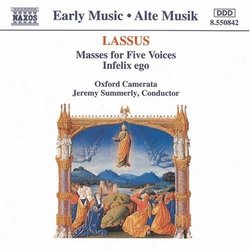| All Artists: Orlande de Lassus, Jeremy Summerly, Oxford Camerata Title: Lassus: Masses for Five Voices; Infelix ego Members Wishing: 0 Total Copies: 0 Label: Naxos Release Date: 6/28/1994 Genre: Classical Style: Opera & Classical Vocal Number of Discs: 1 SwapaCD Credits: 1 UPC: 730099584227 |
Search - Orlande de Lassus, Jeremy Summerly, Oxford Camerata :: Lassus: Masses for Five Voices; Infelix ego
 | Orlande de Lassus, Jeremy Summerly, Oxford Camerata Lassus: Masses for Five Voices; Infelix ego Genre: Classical
|
Larger Image |
CD DetailsSimilar CDs
|
CD ReviewsTwo masses of great sensual beauty Sator | Sydney, Australia | 07/13/2005 (5 out of 5 stars) "Orlando Lassus or Roland di Lasso (c.1532 - 1594) stands as one of the most fascinating composers of the Seconda Prattica - a group of composers who stand apart from their predecessors in that their music reflects the social and political upheavels of the Reformation and Counter Reformation. The complex polyphony of the Prima Prattica came under attack as being mere artifice that obscured the meaning of the texts of sacred works and with it came a push towards an increasing dismantling of the extraordinary complexity that the previous generations had endowed music. Palestrina definitely shows such tendencies along with the refined pious delicacy of his music. Palestrina also begged humble forgiveness for writing the typically blatently erotic chansons in his youth, that were typical throughout much of the Renaissance - even the greatest composers wrote them. This seems to reflect an increasingly puritanical prudishness that was a characteristic of the Reformation and which the Counter Reformationists tried to outdo. Thereafter this sexual openess and innocence of expression was banished from composition - I can scarcely think of a single genuinely explicitly erotic text set to music by a major Western composer thereafter. In stark constrast to Palestrina, Lassus tenaciously refused to succumb to this new spirit of prudery. The Humanist spirit in him silently rebelled against this wave of oppression. This reflects in his refusal to systematically disinherit himself of the polyphonic riches of the Prima Prattica that had been handed down to him and continued to happily write for five or six voices as it suited him. However, even more remarkable was the brazen refusal to give up writing parody masses based on explicitly erotic chansons - in blatant violation of the decrees of the Council of Trent. Of this tendency there is no better example than the Missa Entre Vous Filles. The original chanson comes from none other than the great Clemens non Papa (can you imagine Schubert or Brahms writing a Lied like this!): Entre vous filles de quinze ans, Ne venez plus à la fontaine, Car trop aves les yeulx frians Tetin poingnant bouche riant connin mouflant Le cueur plus gay qu'une mistaine Entre vous filles de quinze ans, Ne venez plus à la fontaine! [You girls, fifteen years old, Don't come to get water at the fountain, Because you have darling eyes, Pert breasts, laughing mouths, warm little cunny Hearts gayer than a dream You girls, fifteen years old, Don't come to get water at the fountain!] Even where the choir sings 'Kyrie eleison' the listeners of Lassus' time must have known perfectly well where the melody came from. Whatever the original chanson parodied here, the crucial things is how truly remarkable the final work really is. For it is a mass of refined sensuality, as well as of an exquisite and deeply felt beauty. The second mass here is Susanne un jour. Susanne un jour d'amour solicitée Par deux viellardz, convoitans sa beauté, Fust en son coeur triste et desconfortée, Voyant l'effort fait à sa chasteté. Elle leur dict, Si par desloyauté De ce corps mien vous avez jouissance, C'est fait de moy. Si ie fay resistance, Vous me ferez mourir en deshonneur. Mais j'aime mieux périr en innocence, Que d'offenser par peché le Seigneur. [Susanna faire, sometimes of love requested By two old men whome her sweet looks allur'd Was in her heart full sad & sore molested Seeing the force her chastitie endur'd. To them she said, if I by craft procur'd Doe yield to you my body to abuse it, I kill my soule, & if I do refuse it, You will mee judge to death reproachfully. But better tis in innocence to choose it, Than by my fault t'offend my God on high.] Translation by Nicholas Yonge from the Musica Transalpina, 1588 Renaissance paintings of the theme of Susanna take great pleasure in showing her in the nude while two dirty old men leered on and clearly Lassus is using a Biblical theme to endulge in a similar pleasure in the sensual aspects of the figure of Susanne. Yet this work too is ultimately remarkable first and foremost as a richly conceived polyphonic masterpiece. Both this and the other mass here help to explode the myth that Lassus' best music is to be found in his motets. By way of stark contrast the one motet on this is set to the text by the demongogue preacher Savonarola. Savonarola is infamous for the 1497 Bonfire of the Vanities. They burnt items supposedly associated with moral depravity such as mirrors, cosmetics, jewelry, non-sacred books, gaming tables, fine dresses on a large fire at the Piazza della Signoria in Florence. Even Sandro Botticelli threw his own works on the pyres. A backlash against the puritanical oppression forced upon the city of Florence soon followed and during Savonarloa's Ascension Day sermon on May 4, 1497, bands of youths revolted so that taverns were soon reopened, and men gambled openly in public. Savonarola's fall from grace was completed when he was accused of falsely claiming to see visions and uttering prophecies. With Machiavelli amongst the onlookers he was hung and burnt publically. The text of this motet 'infelix ego' (misfortunate I) was written on the eve of his public execution. One only wonders what motivated Lassus to set it to music. The only real oddity in this CD are the notes by Jeremy Summerly which contains too little information to be of any help whatsoever. Most amusingly the text of the Savonarola is included but any direct quotation from the original chansons that Lassus based his masses is strictly avoided. There is only the one fleeting and blushing reference to Susanne en jour 'celebrating in galloping rhyme the wonders of the female anatomy' - a case of 'no sex please we're British' perhaps? Nonetheless the performances here all do Lassus great justice. The sound of the Oxford Camerata has luminosity and sensual lyricism to fully convey the warmth of the writing. Summerly seems to have a genuine feel for the music of Lassus - something you can also sense with their recording of the Missa Bell' Amfitrit' altera. Definitely worth hearing!" Natural eloquence Dr. Richard M. Price | London, UK | 03/31/2002 (5 out of 5 stars) "Reviewers do not seem to have paid special attention to this CD, but I find it one of the most convincing recordings of late sixteenth-century polyphony. The Missa Susanne un jour and the setting of Infelix ego are among Lassus's best works, and receive here performances that are models of unforced phrasing and natural eloquence. The recorded sound (which sounds a little dull in some of the other recordings from this choir and location) is fully adequate to convey the warmth and fullness of Lassus's choral writing. It is a recording that I have listened to repeatedly for years with always renewed enjoyment." Lush and Rich J. P. Johnson | Ewing, NJ United States | 12/30/2000 (5 out of 5 stars) "The music here is "lush" (as the liner tells us) and rich. The voices of the Oxford Camerata never disappoint on this beautiful recording, made in the Chapel of Hertford College, Oxford. I was struck by the full harmonies of these pieces and by the Oxford Camerata's sensitive dynamics."
|

 Track Listings (11) - Disc #1
Track Listings (11) - Disc #1


